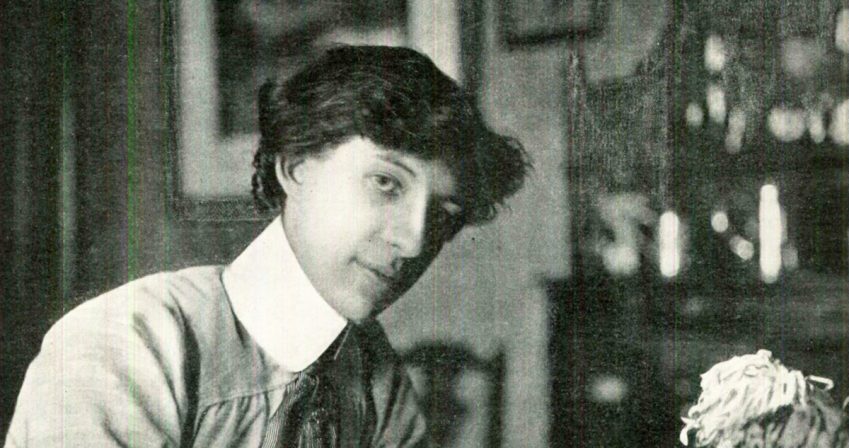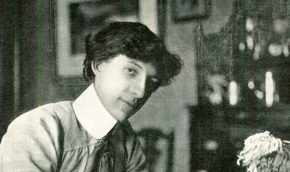Women in Law
- Introduction
- Timeline
- Joyce Bamford-Addo
- Marion Billson
- Jill Black
- Elizabeth Butler-Sloss
- Sue Carr
- Eugenia Charles
- Lynda Clark
- Freda Corbet
- Coomee Rustom Dantra
- Leeona Dorrian
- Heather Hallett
- Frene Ginwala
- Rosalyn Higgins
- Daw Phar Hmee
- Lim Beng Hong
- Dorothy Knight Dix
- Sara Lawson
- Elizabeth Lane
- Theodora Llewelyn Davies
- Gladys Ramsarran
- Lucy See
- Evelyn Sharp
- Victoria Sharp
- Ingrid Simler
- Teo Soon Kim
- Ivy Williams
- The Significance of the Sex Disqualification (Removal) Act 1919
- Women in Law Podcasts
Home › Women in Law › Pioneering Women in Law › Bertha Cave
Bertha Cave
(1881-1951)
Bertha Cave was born at Park Lodge, Sundridge, Kent, on 14 November 1881. She was the daughter of James Thomas Cave, a domestic servant and later butler to William Tipping (railway director, sometime Conservative MP for Stockport and archaeologist), and his wife Annie, née Barker, also a servant. By 1900 Cave was living with her mother and her younger brother in Croydon, while her father remained in service. Cave made an extraordinary challenge to the legal profession when she applied to become a member of Gray’s Inn. When refused admission, she challenged that rejection. She is the model of determination and icon for anyone who is or feels like an ‘outsider’.
There is no evidence as to why Cave made this application to Gray’s Inn or as to who supported her. On 3 March 1903 Cave applied to join Gray’s Inn. She wrote on her application:


The only known photograph of Bertha Cave, featured on the front cover of "The Tatler" of 9 December 1903 during her brief period of celebrity. Courtesy of The Honourable Society of Gray's Inn.
Her application was considered during a meeting of the benchers at Gray’s Inn on 13 March. While two benchers supported her application, a decision was adjourned and referred for further consideration to a pension committee. This committee met on 24 April where the benchers considered whether they had the power to admit as students women wishing to be called to the Bar. On the question of the power to admit a woman, they referred to the regulations on details of dress and exercise which, according to their ordinary and natural sense, indicated that males, and males alone, were admissible as students. The committee concluded that when the regulations were read in the light of their uniform and uninterrupted usage for so long, they appeared to be conclusive against the power of their society to admit women for the purpose of being called to the Bar.
Cave appealed against this rejection and her appeal was heard in the Moses Room of the House of Lords on 2 December 1903, when she appeared as a litigant in person before a formidable group of judges, sitting not in their judicial capacity but as an appeal tribunal to the Inns of Court. Lord Halsbury, leading the tribunal, demanded that she provide precedent that they could admit her. As no woman had ever been admitted to the Bar, she could cite no such authority.
After the hearing Cave was reported to have said that she intended to practise as an ‘outside lawyer’, later she would threaten to join the Middle Temple, sit for an LLB or join the Law Society, none of which she ever did.
Cave briefly appears in two later newspaper reports both in 1904. One report concerned a debate Cave appeared in alongside Christabel Pankhurst calling for women to be admitted to the legal profession. The other report featured a trial about a defective bicycle in which cave appeared upon behalf of her father (she lost). Then publicly Cave vanished.
Privately Cave married Colonel Ali Altaf (or Altof) in the Savoy Hotel on 1 December 1905, in a religious ceremony. He was a colonel of the princely State of Kapurthala, India, whom she had met in 1903. A widower, he had come to England in 1900, and was called to the Bar on 24 June 1903. She adopted his Muslim faith. By 1912 the marriage was over and they had returned to England. He left for India alone in 1913 and on 16 June 1920 she was elected as Fellow of the Royal Microscopical Society, emigrating to Canada in November 1920 with her mother (they were travelling to her brother who had already emigrated there) where she worked as a bacteriologist. She described herself as a widow on her documents even though her husband was still alive. She died in Toronto in 1951.
Cave’s story tells us much about a legal profession that was terrified of competition or any change to the status quo. Cave challenged the male exclusivity of the legal profession. This in turn threatened the rigid class system that controlled the whole of society. Women threatened the established order. Until the passing of the Sex Disqualification (Removal) Act 1919 women were denied from the practise of law. This denial ruined aspirations and Cave’s story gives us an example of one such ruined dream. Cave’s never realised her ambition to practise law.
Dr Judith Bourne
Programme Director for Law at St Mary’s University
With thanks to Andrew Mussell, archivist at Gray’s Inn, Humayun ‘Hank’ Khan (khan.hank@yahoo.com) descendant of Colonel Altaf and Gary Phillips, Solicitor, Sills and Betteridge Solicitors https://www.sillslegal.co.uk/team/a13/